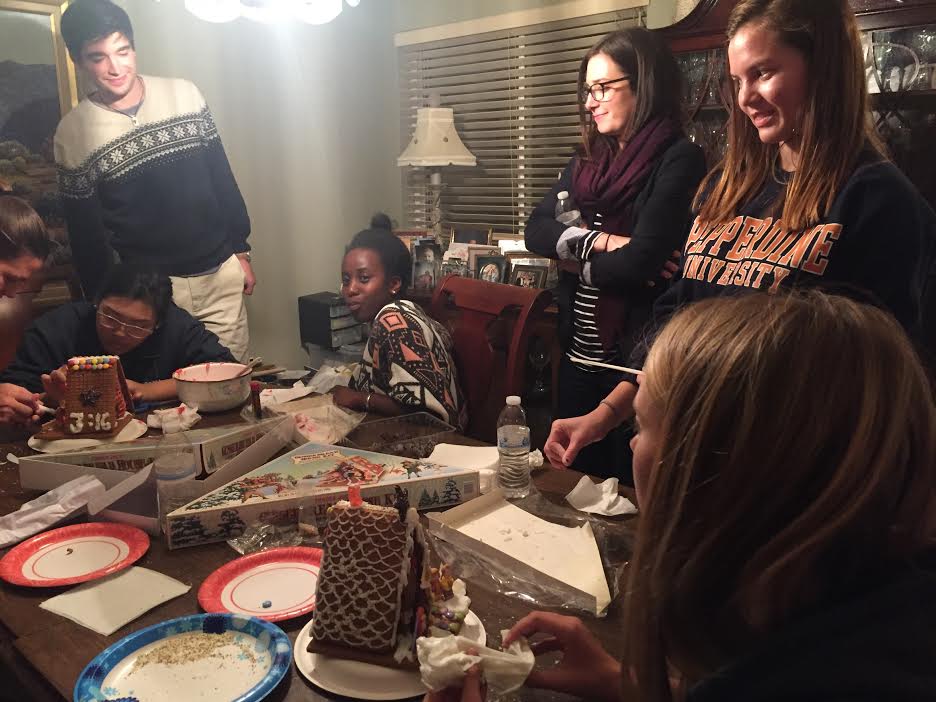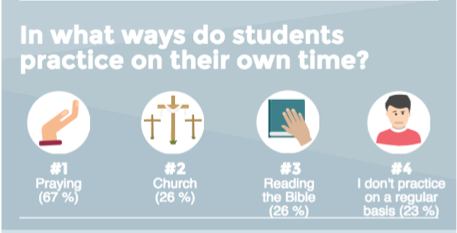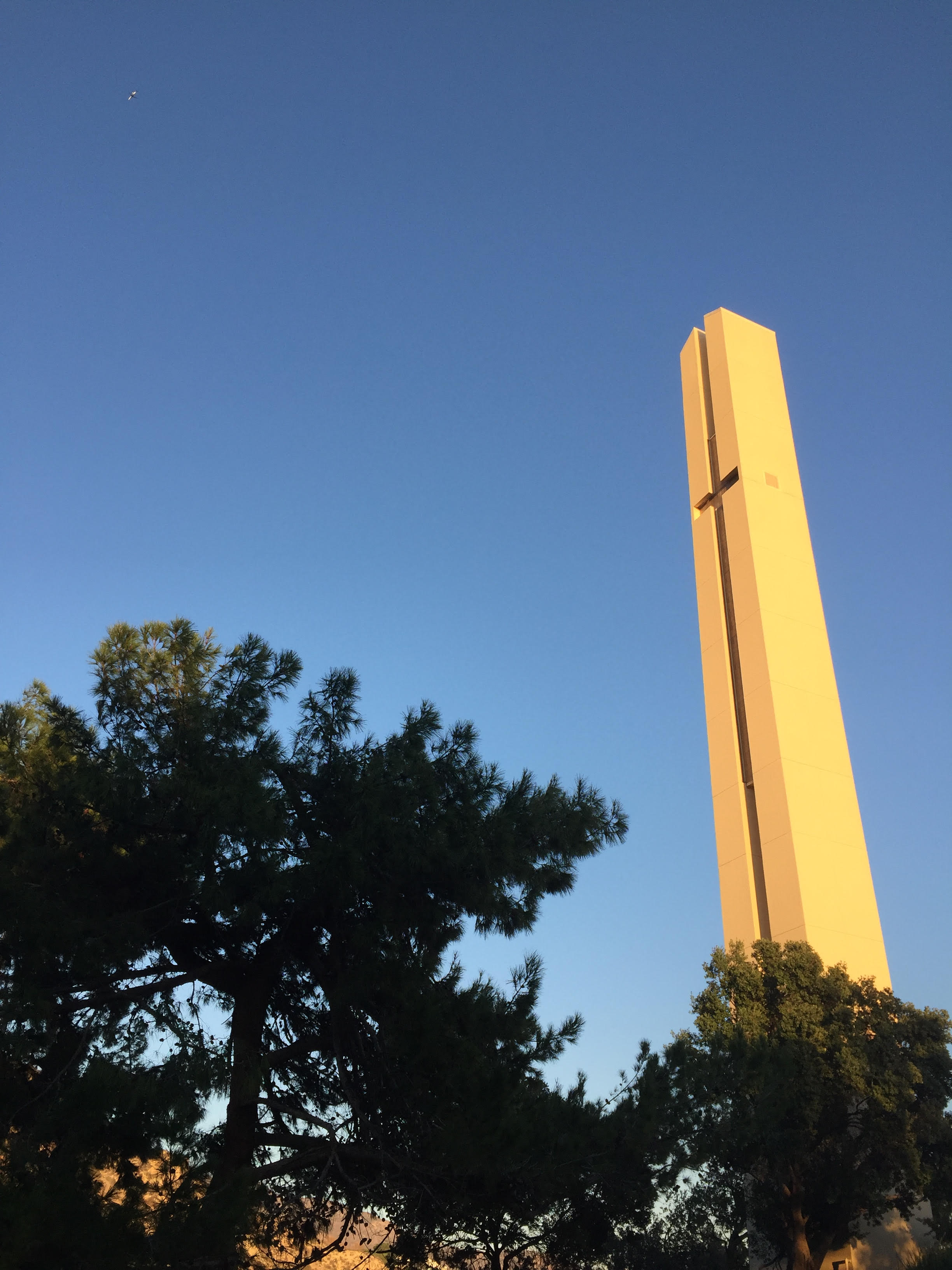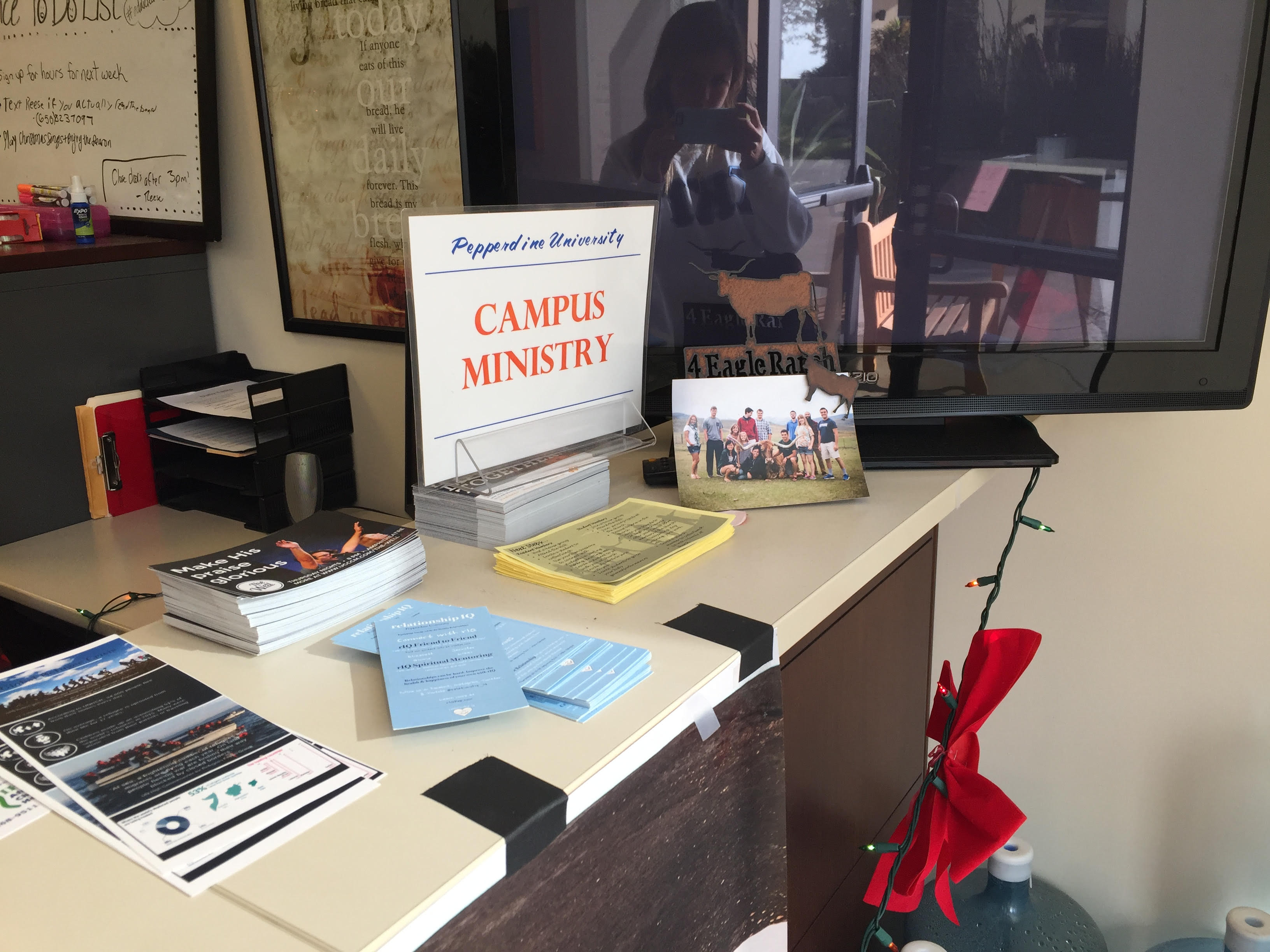
It’s Sunday morning and the church bells are calling, but how many students actually make it to church?
Most college students might forget church and catch up on sleep, do some homework or go to brunch – but Pepperdine students are no average college student. The Pew Research Center found in a 35,000-person, 2014 survey that a growing number of young, American millennials are nonreligious. About 64 percent of today’s college students are religious, and 36 percent are unaffiliated with any faith.
A Pepp Post survey of 50 students found that 80 percent still identify as religious. Some 68 percent of students polled claim they make time to practice religion, but only 24 percent said that involved attending church on a regular basis. Students are finding other ways to practice faith on their own terms.
“I practice individually, I pray a lot,” Ricardo Rodriguez, a sophomore business administration major, said. “I try to go to church on Sundays, but it’s just hard finding the motivation to actually go.”
The top three denominations represented in the survey were Roman Catholicism, at 30 percent, Church of Christ, at 18 percent, and nondenominational Christian, at 16 percent. This data has a slight variance with the University’s Office of Institutional Effectiveness data. Out of 3,314 students that enrolled into Seaver College in the fall 2016 semester, more than 29 percent said they were ‘other Christian,’ more than 16 percent said they were Roman Catholic, 13 percent said they were Church of Christ, and just shy of 12 percent did not declare their religious affiliations.
Graphic by Alexa Garza Valencia using Piktochart
More than two thirds of students said daily prayer was how they kept in touch with their faith. Pew found that only 51 percent of college students claim to pray daily.
About 26 percent of students said they read the Bible. Another 24 percent identified with a religion, but didn’t practice on a regular basis.
Other students said they seek spiritual guidance, attend convocation events voluntarily, or do other things such as journaling or volunteer work.
Despite popular belief, not all students fall under the Pepperdine stereotype of being super-religious. The majority of students surveyed said they didn’t end up at Pepperdine because they were looking to grow their faith or because they were only interested in Christian schools. In fact, 56 percent of students said they did not chose Pepperdine because of its Christian-affiliation.
“I didn’t really care about what religious views (Pepperdine) had,” Kevin Li, a junior international business major, said. “I was more concerned with how good of a business program they had and which program was better suited for my way of learning and networking.”
Monica Avila, a sophomore journalism student, said she wasn’t interested in the religious aspect at all, and rather chose the school because of its acclaimed journalism program and small-class sizes.
Other students, such as junior communication major Jason Garofolo, chose Pepperdine for the unique social environment.
“I don’t party or do any of that stuff,” Garofolo said, “so that was kind of an influence because I thought the type of people who are attracted to go here, since it is a Christian school, would probably be people with higher morals and values, and I wanted that.”
The Theme Tower at Pepperdine represents the university’s Christian mission to all who drive by (Photo by Alexa Garza Valencia).
Going away to college can make or break one’s faith, and most of the time students will find it more difficult to practice because they have to make the conscious decision to be religious on their own. America’s Class of 2018 cares less about religious identity than any other group of college freshman in the last 40 years, according to the University of California, Los Angeles’ study “The American Freshman.”
But not at Pepperdine.
Because Pepperdine has many different outlets for growing students’ faith, such as convocation, Bible studies and student ministry programs, 44 percent of students said it was about as hard/easy to practice faith here as it was at home.
“I wasn’t ever really pushed back home because we didn’t go to church every Sunday,” Drake Swift, a freshman art and computer science student, said. “I would actually even say I’ve gone to church more here.”
Other students, like freshman art major Melissa Labnodw, said she was quite involved in her congregation back home and chooses to attend here too. Labnodw said she grew up going to church every Sunday, praying at home as a family, and participating in youth groups and mission trips.
“I choose to attend my dorm’s weekly Bible study along with going to on-campus church every Sunday morning,” Labnodw said. “I also attend Surf Chapel every Wednesday.”
Reese Richardson, an intern for the University Church of Christ Campus Ministry, said Sunday church attendance at Stauffer Chapel is around 147 people on average.
Campus Ministry’s House Groups also cater to students’ spiritual needs. They are small groups that meet at a professor’s home once a week, and really help the Pepperdine community feel like a family. Students pray together, worship in song together, and share personal struggles and accomplishments with the tight-knit group.
“House groups really make Pepperdine feel like a home where you have family,” freshman psychology major Kenzie Winslow said. “In the sense of having an older, wiser Christian to look up to, and brothers and sisters like your peers who share similar struggles here.”
Spiritual Life Advisors are also present in every dorm on campus. SLA’s dedicate more than 20 hours a week for 10 months in order to serve Christ and coordinate Bible studies, accountability groups and prayer groups within the dorm community.
Some students attend convocation events like Surf Chapel in order to complete their mandatory credits, but others enjoy the opportunities Pepperdine offers because they value spirituality and practice.
“I wouldn’t say the majority of students go beyond their mandatory credits,” said Chris Shea, the project coordinator for convocation at the Office of the Chaplain. “There is a niche group of people who will have up to 30 credits but these people usually get into a rhythm, and we found that the people in their friend groups also have high convocation attendance.”
Student Affairs intern Pauline Van Backel said it becomes a social thing.
“People will keep going after they’ve completed their credit because all of their friends keep going too,” she said.
The University Church of Christ Campus Ministries Office on campus helps coordinate various events such as the Well and a student-centered Sunday service (Photo by Alexa Garza Valencia)
About 130 students attend the weekly Well event, which is a time for worship in community through song. Their mission is to bring water (Jesus) to a campus dying of thirst, Well intern Esther Young said. Attendance varies depending on what point in the semester it is. For instance, around finals attendance drops.
“I love going to the Well even though it’s not a convo event,” Julia Solazzo, a junior studio art major, said. “It’s my way of practicing on my own time, because I don’t go to church unless it’s a holiday but I will go to the Well whenever I can because I love it.”
Solazzo said going to the Well made her feel closer to God, and more spiritual than attending church did. She enjoys the fact that it is not mandatory and likes to know that when she’s there she is there because she wants to be there for herself.
Carlie Ott, a sophomore creative writing student, said she doesn’t mind having to attend convo events but that she wishes there were more options because her favorite event is Celebration Chapel on Fridays and her work schedule makes it hard to attend.
Some 44 percent of students said they had neutral opinions about mandatory convocation events, followed by 34 percent who said convocation was a positive force at school. Only 11 percent said they thought convocation was negative because it felt forced, boring, or because they weren’t Christian it felt awkward.
“Growing up we believed that faith was more important than practice,” Olivia Belda, a sophomore integrated marketing communication major, said. “Christianity is not a religion, it’s a relationship.”
Many students, such as Alberto Hinojosa, have taken perspectives similar to Belda’s. Faith and spirituality is more important than actually going to church, or participating in Bible study groups or retreats.
“I think it’s more important to pray and keep God present in your life than it is to be at church every single Sunday or to be at mission trips and Bible studies,” said Hinojosa, a junior business administration major. “Although of course these things make it easier to keep God present in our lives. We all just need to be good people.”
Alexa Garza Valencia completed this story in Dr. Christina Littlefield’s fall 2016 Jour 241 class.






